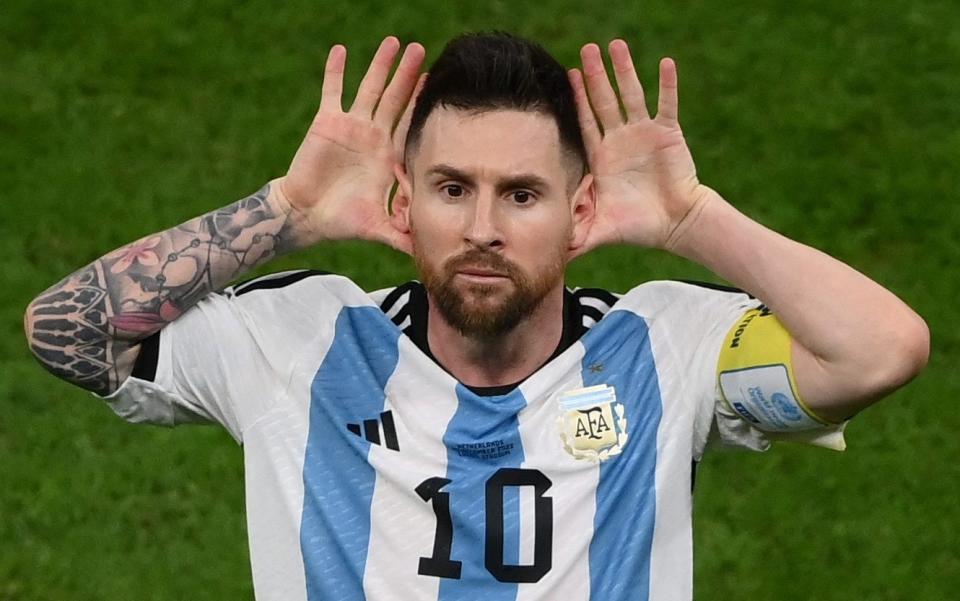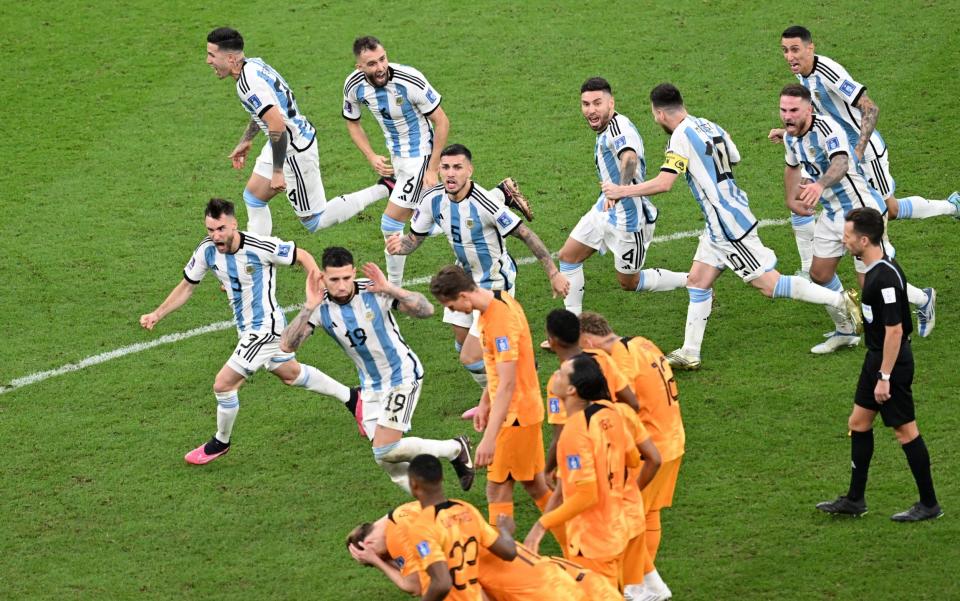
The lustre of Lionel Messi is so immaculate that his angry goading of opponents, a trait saved up for his farewell World Cup, looks at first sight like the work of a different man. The study of Argentina’s captain as quasi-deity – Leology, if you will – elevates him above all petty vulgarities, such as backchat to a referee or “mouse-ears” celebrations of a victory on penalties.
As such, Messi’s tormenting of the vanquished Dutch did not fit the sanitised narrative. At times here in Qatar, it feels as if he is being swept to the trophy on an unadulterated sugar-rush. Take Rio Ferdinand, who gushed that his contribution against Australia in the Round of 16 was the “best individual performance” of the tournament. It was quite the claim, given he had offered nothing until his 35th-minute goal, barely breaking stride for much of the match. But when the most romantic resolution to his career is still possible, nothing can dilute the syrup.
It was unsettling to watch Messi’s carry-on in the quarter-final. His implacability has long played in his favour in the parallels with Cristiano Ronaldo. But clearly, he is prepared to defy any preconception of the one prize that has eluded him. A man once wonderfully uncomplicated is reinventing himself, for his final international stand, as a purveyor of the dark arts.
A double-edged fascination surrounds Argentina ahead of their semi-final with Croatia. On the one hand, they are propelled by the broiling passions of the 90,000 who have travelled here from Buenos Aires and beyond. But in neutrals’ eyes, their reputation is disfigured by the skulduggery to which they so often resort. They incurred eight bookings amid the tumult of beating the Netherlands, with Fifa investigating both federations.
Messi, in particular, came across as a playground bully at times, yelling at one of Louis van Gaal’s staff: “What are you looking at? Fool!” Neither Nicolás Otamendi nor Leandro Paredes covered themselves in glory with their taunting, while goalkeeper Emiliano Martínez left himself liable to punishment by impugning the integrity of the referee. Even if Argentina were riled by the Dutch, some of their behaviour in response bordered on thuggish.


For Lionel Scaloni, their clean-cut young manager, any accusations of malevolent conduct amount to a grievous insult. “We need to put an end to this idea of us not being good winners or losers,” he said. “That’s very far from who we actually are as a team, as a squad and as the way we represent this nation.”
Is it, truly? Argentina’s recent antics seem of a piece with their history of chicanery, spanning everything from Diego Maradona’s “Hand of God” to Diego Simeone rolling on the Saint-Étienne grass to help ensure that David Beckham was sent off. But Scaloni was adamant that, under his four-year reign, they had cleaned up their act.
“The last game was played in exactly the way we needed,” the 44-year-old argued, trying to justify the melee that followed the shoot-out at Lusail. “In football, sometimes things like this happen. There can be arguments, more challenging times, but that’s all. That’s why there is a referee, to deliver justice. And we need to put an end to this idea of thinking that in Argentina, we usually have that kind of behaviour.
“We lost to Saudi Arabia, we didn’t say anything. We won the Copa América in Brazil and we witnessed the most sporting behaviour between Messi, Paredes and Neymar. They were all sitting together in that tunnel at the Maracana, so I’m really not convinced of this notion of us being unsporting. We need to show our pride and we just played the game the way we had to play it. Things end in the moment the referee blows the final whistle. We respect all the opponents we face, whether it’s the Netherlands. That’s one of the main features of our personality.”
The sight of his players haring up the pitch after Lautaro Martínez’s decisive penalty, mocking their victims to their faces, did not exactly paint them as the graceful types. Theirs is an identity forged perhaps less from Messi’s wizardry than from a snarling, belligerent defiance.
The more Messi reveals a different side to his nature, the more his team-mates reaffirm their loyalty. Nicolás Tagliafico, the Lyon left-back poised to replace the suspended Marcos Acuña against Croatia, said: “He has always been like this, he’s our captain and leader, pushing and motivating us. We have a special advantage when he’s here, here’s a great source of motivation. With everyone’s support, we try to work in the same direction and achieve our dream. That’s the most beautiful thing to do with Messi by our side.”
Argentina might imagine that they are, to invoke one of Jürgen Klopp’s favourite phrases, “mentality monsters”. But they are equalled on this front by Croatia, whose suffocating midfield intensity has already accounted for Brazil. Ratcheting up the psychology, manager Zlatko Dalic left little doubt as to who was shouldering the greater burden of expectation. “The great Argentina have more support than us, but they are under more pressure than us,” he said.
After this second successive run to the last four, Dalic became visibly emotional in describing the example that Croatia, a country of just 3.8 million people, was setting for the world, in particular for fellow semi-finalists Morocco. “Everyone in life has a right to make dreams,” he said. “Croatia made the dream a reality for small countries.” The warning for Messi, ready to go to any lengths here in fulfilment of his own dream, could hardly be clearer.
